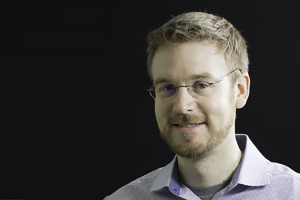
UNC Lineberger’s Wesley Legant, PhD, assistant professor in the UNC-NC State Joint Department of Biomedical Engineering and the Department of Pharmacology, received a prestigious Packard Fellowship to enhance his research on new kinds of microscopy techniques to further biomedical discoveries at the UNC School of Medicine and beyond.
Legant was one of 22 early-career scientists and engineers announced as Packard Fellows for Science and Engineering by the David and Lucile Packard Foundation. These early-career scientists and engineers will each receive $875,000 over five years to pursue their research.
Work in the Legant Lab spans the development of cutting-edge fluorescent microscopes, machine learning algorithms for intelligent instrument control and image analysis, and applications to fundamental biological phenomena including cell division, cell migration, and cell differentiation.
“I’m especially excited and grateful for this award from the David and Lucile Packard Foundation,” Legant said. “It will allow us to follow new and exciting directions, inspired by what we see under the microscope, and will connect us to an outstanding network of fellows working in very diverse fields.”
Legant was named a Searle Scholar, Beckman Young Investigator, and NIH New Innovator Award winner all earlier this year.
The Packard Fellowships in Science and Engineering are among the nation’s largest nongovernmental fellowships, designed to allow maximum flexibility in how the funding is used. Since 1988, this program has supported the blue-sky thinking of scientists and engineers with the belief that their research over time will lead to new discoveries that improve people’s lives and enhance our understanding of the universe.
Fellows have gone on to receive a range of accolades, including Nobel Prizes in Chemistry and Physics, the Fields Medal, the Alan T. Waterman Award, MacArthur Fellowships, and elections to the National Academies. The Fellows also gather at annual meetings to discuss their research, where conversations have led to unexpected collaborations across disciplines.
“This new class of Fellows is about to embark on a journey to pursue their curiosity down unknown paths in ways that could lead to big discoveries,” said Frances Arnold, PhD, chair of the Packard Fellowships Advisory Panel, 2018 Nobel Laureate in Chemistry, and 1989 Packard Fellow. “I can’t wait to see what direction the work of these brilliant scientists and engineers will take. Their efforts will add to this beautiful web of science that connects us all to a better understanding of the world around us.”
The Fellowships program was inspired by David Packard’s commitment to strengthen university-based science and engineering programs in the United States. He recognized that the success of the Hewlett-Packard Company, which he cofounded, was derived in large measure from research and development in university laboratories. Since 1988, the Foundation has awarded $429 million to support 617 scientists and engineers from 54 national universities. This year’s Fellowships are also supported in part by the Ross M. Brown Family Foundation.
